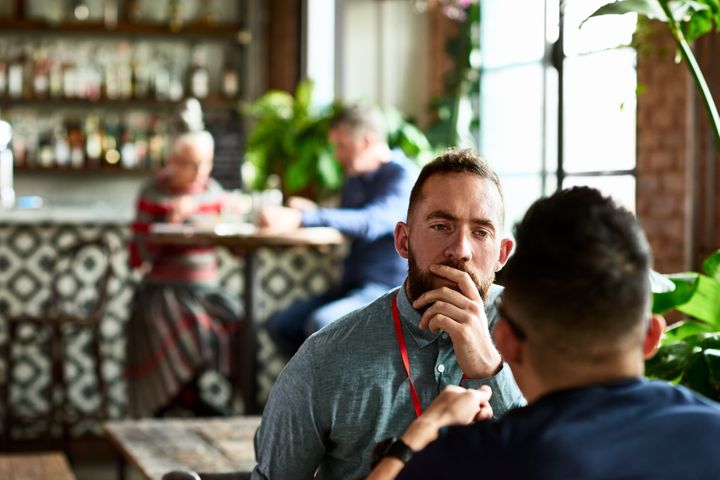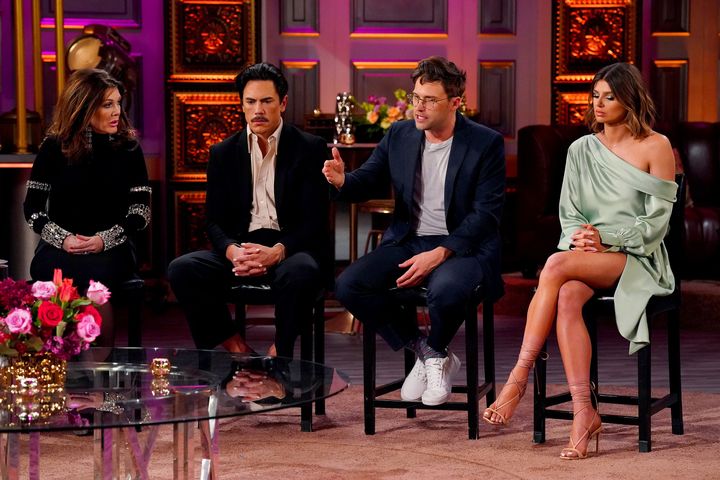It’s a position no person wants to be in: You find out a close friend is cheating and now you feel like you’re morally compromised, too, just by knowing.
Do you advise them on what to do? Suggest they talk to their partner? Play moral referee and let them know you think it’s wrong that they’re stepping out? Take a “not my circus, not my monkeys” approach and stay out of it?
The complicity of friends in situations like this has been top of mind for fans of Bravo’s “Vanderpump Rules” for the last few months: Tom Schwartz, a key cast mate on the reality show, is still feeling the blowback over his role in best friend Tom Sandoval’s affair with cast mate Raquel Leviss.
By his own admission, Schwartz knew about Sandoval cheating on Ariana Madix, Sandoval’s girlfriend of nine years, for almost the entire duration of the affair. Schwartz’ allegiance may lie with Sandoval ― as well as his financial future (they own two bars together) ― but he and Madix are also close. (She even served as a groomswoman at his 2019 wedding to cast mate Katie Maloney.)
Why didn’t he tell Madix about the affair? In April, Schwartz told Bravo producer Andy Cohen that he was “being fed a narrative that [Tom] has broken up with Ariana, or attempted to multiple times — many, many times. And he’s not happy, they’re not healthy, they’re not intimate, blah blah blah.”
“He did a good job of placating me,” he told Cohen. “And he told me he has a game plan, he’s gonna do the right thing — and then he just kind of continued to keep procrastinating.”
When Cohen asked if Schwartz was also angry with Leviss, he admitted, “I’m more upset with Sandoval because he took advantage of my kindness. And he put a lot of people, not just myself, in very compromising situations where our integrity was at stake.”
Therapists who’ve kept up with the “Vanderpump Rules” affair had some thoughts on how Schwartz handled being in the middle.
“I think he handled his best friend’s affair the way that most friends end up handling this type of situation: They may initially give their friend advice to either end the affair or to be honest with their partner, and then in order to avoid conflict, take a passive or even supportive role, hoping their friend heeds their advice,” said Abigail Makepeace, a marriage and family therapist based in Los Angeles, California.
It’s obviously a difficult position to be in, because while you may deeply disapprove of their actions, you still value their friendship.
“If you make the decision to ‘out’ your friend for having an affair, you are taking the huge gamble that might end your friendship, as well as their marriage or relationship, on the whole,” she said.
Because this reality TV conundrum is common offscreen as well, we asked Makepeace and other therapists to share the advice they’d give to other people in a situation like Schwartz’. See what they had to say below.

Set boundaries with your friend.
You may not have had a choice in your friend divulging their affair. But you do get to decide how involved you want to be in the mess moving forward, said Sheri Meyers, a marriage and family therapist and the author of “Chatting or Cheating: How to Detect Infidelity, Rebuild Love and Affair-Proof Your Relationship.”
“It’s important to set your boundaries and tell your friend what you are willing to do and what you won’t do,” she said. “Maybe it’s telling them, ‘I love you, however I’m not willing to lie for you’ or ‘I don’t want to be put in the middle in any way or socialize with this new person.’”
You can establish a boundary like that while still lending them your support.
“You can decide: ‘I’m willing to help you work things through, and do whatever I can to get you the support you need’ or ‘I am your friend and care for you no matter what,’” Meyers said.
Think twice before allowing yourself to be their alibi.
Caroline Madden is a marriage and family therapist who helps couples repair after infidelity. (She’s also the author of a number of books on infidelity.) Her strong advice for any friend put in a Schwartz-like position is not to become an alibi for your friend, even if your friend presses you.
“It never ends well,” Madden told HuffPost. “It is one thing to turn a blind eye to bad behavior and quite another to actively participate in deception, especially if the betrayed partner is a friend as well.”
The betrayed partner will likely have questions about the whole situation and who else was involved. If you’re seen as someone who knew about the cheating but didn’t do enough to stop it, it could seriously jeopardize your friendship with both people.
“If they get back together, the betrayed partner might even require their wayward partner to end their friendship with you,” Madden said.

lechatnoir via Getty Images
Let your friend know how the situation is making you feel.
If you feel like you’ve been put in an uncomfortable position of having to cover or conceal when you’re with your friend and their partner, it’s a good idea ― and an honest friendship move ― to share those feelings with your friend, said Amy Begel, a marriage and family therapist and the author of “Diagnosis: Human: How Unlocking Hidden Relationship Patterns Can Transform and Heal Our Partners, Our Children, Ourselves.”
“In any cases like this, people sometimes end up feeling like they’re the cheater,” Begel said. “Tell your friend that you feel your integrity is being compromised. Don’t soften it. Suggest that he come clean with his partner; otherwise you may have to put your friendship on ice until he figures his stuff out.”
If you begin feedback like this by first affirming that you still love and support them, your friend will likely be more receptive to what you have to say, Makepeace added.
“Communicate to your friend that your biggest concern with their cheating isn’t shame or judgement-based ― about ‘wanting them to do the right thing,’ for instance ― but instead comes out of a deep concern for their making irreversible decisions,” she said. “That might help them more deeply process potential outcomes and hear your feedback less reactively.”
These are gutsy positions to take, Begel said, “but it will probably be appreciated in the long run.”
Ask yourself: How will I feel about this a year from now?
Regardless of what you do, even nothing, you’re still likely to have someone upset with you at some point ― often really upset, said Kurt Smith, a therapist in Northern California whose counseling practice specializes in helping men.
“It’s the ultimate no-win situation,” he told HuffPost.
If you feel morally conflicted, it might help to ask yourself which option you’re most likely to be disappointed in yourself for taking when you look back a year from now, Smith said.
“Friends can come and go, but we have to live with ourselves and our integrity forever,” he said. “It’s common to look back on our choices with regrets. It sounds like Schwartz has some. This is a situation where the best choice is to be true to the person you want to be and not allow yourself to be swayed by what your friend wants.”

